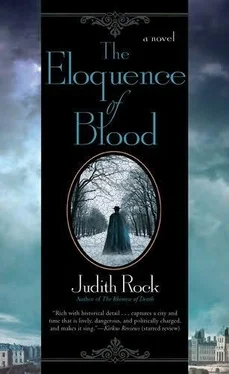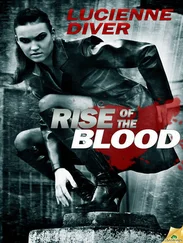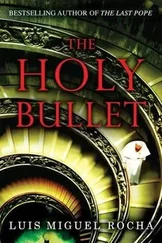Judith Rock - The Eloquence of Blood
Здесь есть возможность читать онлайн «Judith Rock - The Eloquence of Blood» весь текст электронной книги совершенно бесплатно (целиком полную версию без сокращений). В некоторых случаях можно слушать аудио, скачать через торрент в формате fb2 и присутствует краткое содержание. Жанр: Исторический детектив, на английском языке. Описание произведения, (предисловие) а так же отзывы посетителей доступны на портале библиотеки ЛибКат.
- Название:The Eloquence of Blood
- Автор:
- Жанр:
- Год:неизвестен
- ISBN:нет данных
- Рейтинг книги:5 / 5. Голосов: 1
-
Избранное:Добавить в избранное
- Отзывы:
-
Ваша оценка:
- 100
- 1
- 2
- 3
- 4
- 5
The Eloquence of Blood: краткое содержание, описание и аннотация
Предлагаем к чтению аннотацию, описание, краткое содержание или предисловие (зависит от того, что написал сам автор книги «The Eloquence of Blood»). Если вы не нашли необходимую информацию о книге — напишите в комментариях, мы постараемся отыскать её.
The Eloquence of Blood — читать онлайн бесплатно полную книгу (весь текст) целиком
Ниже представлен текст книги, разбитый по страницам. Система сохранения места последней прочитанной страницы, позволяет с удобством читать онлайн бесплатно книгу «The Eloquence of Blood», без необходимости каждый раз заново искать на чём Вы остановились. Поставьте закладку, и сможете в любой момент перейти на страницу, на которой закончили чтение.
Интервал:
Закладка:
“Surely that is not the Huguenots’ fault.” Charles knew more than a little about the French Protestants called Huguenots, some of his own family in the south being counted among them.
Damiot drank and scowled at his glass. “In any case, the New World mines aren’t producing like they used to. Or Spain is keeping it all, who knows? What anyone with two thoughts to rub together does know is that war against the Augsburg Alliance countries is inevitable, and war always means new taxes. And what will a new war do to trade? Prices will no doubt go up. And if the next few grain harvests are not good-” He shrugged. “I imagine that those who have something put aside are keeping it.”
“Too bad our king is more concerned with war and glory than with the well-being of his own realm and people,” Charles said grimly.
Damiot’s eyes widened, and he glanced around to see who might be close by. “That’s fascinatingly close to treason. I don’t think I heard that.”
“But I said it,” Charles muttered. “And it’s not treason, it’s reason.”
“Here.” Damiot shoved an ox-shaped cake into his friend’s hand. “You can’t talk with your mouth full.” They gave their attention to eating and drinking. In the rumble of talk around them, Charles caught the words of two priests.
“… but I heard,” the older one said eagerly, “that a demon nearly carried away the reliquary!”
“No, no, just some deranged old beggar, probably an old soldier with a grudge against the Conde. Trying to steal the box and sell it, I imagine.”
“But Pere Pinette would have had a mere mortal-beggar, soldier, what have you-arrested! Explain that!”
A burst of laughter from somewhere covered his companion’s response. Charles shook his head and swallowed the last of his cakes.
“I suppose,” he said to Damiot, “that our rector looks so happy tonight because of this rumored bequest.”
“The prospect of no more bean pottage in the refectory is enough to make anyone look happy.”
Charles sighed in mock despair. “And there was I, hoping that Pere Le Picart was smiling because he liked my performance.”
“Don’t be ridiculous. It was my script he was liking!”
“In fact, it was all of those,” a light dry voice said behind them.
They turned and bowed to Pere Jacques Le Picart, rector of Louis le Grand. The lean and wiry son of a Norman farmer, Le Picart ruled his college with shrewd justice and a warm heart. His cool gray gaze often saw more than a man wanted seen, as Charles had learned last summer when his vocation had hung in the balance.
Le Picart smiled at Damiot. “I greatly enjoyed your play, mon pere. And your performance,” he said, turning to Charles. “In fact, I was marveling that you joined us and not the Opera,” he added with gentle mockery.
Charles bowed his thanks, wondering if Le Picart realized how seriously he’d once thought of choosing the stage-in spite of what that choice would have cost him in parental fury. But then the musket ball tore through his shoulder at the battle of St. Omer, leaving permanent damage and changing everything. The loss of his stage dream had been his gain, in the end, because it had shown him what he really wanted. Though he rarely said it aloud, his deepest wish was to come as close to God as a man could. But he wanted to do it in God’s good world, not behind cloister walls. That desire had led him to the Society of Jesus and the teaching of Latin rhetoric. Which had, in God’s odd economy, restored dance to him.
“I wish Pere Jouvancy were here,” Le Picart said. “He would have been very pleased with you both.”
Charles said, “He brings the boys back from Gentilly on Sunday?”
“Yes.” Le Picart sipped his wine in silence and then raised an ironic eyebrow at Charles. “As I have already said, Maitre du Luc, you were perfectly correct, I was also smiling tonight over the welcome bequest coming to us. Le bon Dieu and all the saints must be growing weary of my unceasing thanks.”
“Can you tell us who the bequest comes from?” Damiot said diffidently.
“From the family of one of our own, Pere Christophe Mynette, who taught here until his death many years ago. Before Christmas, a week or two back, Frere Brunet went to the apothecary in the Place Maubert to replenish his stock of medicines. The apothecary mentioned that Pere Mynette’s niece, the last Mynette relative, had died. May God receive her soul.”
Le Picart and Pere Damiot crossed themselves, but Charles stood motionless, staring at the rector.
“Did you say Mynette, mon pere?”
“He did,” Damiot said. “I remember old Pere Mynette, poor soul. My father knew him. I was still in the Novice House here in Paris, and there was a terrible epidemic of the little pox. It took Pere Mynette among the first. Understandable, since he must have been eighty or so.”
“With the passing of Pere Mynette’s niece, Anne Mynette, the Mynette family dies out,” the rector said. “Otherwise, of course, the family fortune could not come to us.”
“Mon pere,” Charles began reluctantly, but the rector talked over him.
“Monsieur Simon Mynette, who was Pere Mynette’s younger brother, was a well-off lawyer, and always very proud of his older brother’s Jesuit vocation. Jesuits, of course, cannot personally inherit money, but Monsieur Simon Mynette promised that after his daughter Anne’s death, the Mynette money would come to the college in Pere Christophe Mynette’s honor. Anne Mynette, you see, never married and there were no other relatives. No, I lie. I believe there was one other, but he went out to the New World and died there. We have, of course, very carefully kept Monsieur Simon Mynette’s notarized letter explaining all that and laying out what we can expect. I have summoned the notary who drew it up, but he has not yet answered me.”
Charles tried again. “Is Mynette a common name?”
Damiot and Le Picart looked at him in surprise.
“Common enough, I suppose,” the rector said. “Why?”
“Because this morning, when I called on Monsieur Callot from the bourgeois Congregation of the Sainte Vierge, I met a young woman with that surname. Her Christian name is Martine, and she is a friend of Monsieur Callot’s great-niece. This Martine Mynette is an adopted child, and the woman who adopted her, one Anne Mynette, died recently. The girl is distraught because the donation entre vifs, by which her mother left her the Mynette fortune, cannot be found.”
The rector looked as though someone had slapped him. “And where does this girl live?” he said, when he could get words out.
“In the Place Maubert, at the Sign of the Rose.”
“That was Simon Mynette’s house.” Le Picart drained his wineglass and stared narrow-eyed at the wall, as though unpleasant sums were written on the plaster. “This donation-did the girl say who drew it up? And when?”
“She didn’t say when. Monsieur Callot’s nephew drew it up, a notary whose surname is Brion, I don’t know his Christian name.”
Le Picart’s face darkened with anger. “Brion? The notary who witnessed and sealed our letter from Simon Mynette promising us the bequest was Monsieur Henri Brion. He lived near the Place. There cannot be two notaries there called Brion. Why in God’s name did the man not tell us about the donation? That is inexcusable! And his behavior since Mademoiselle Anne Mynette died is also inexcusable. I have sent him message after message, and he sends polite nothing-saying messages back, but he does not come to tell me how things stand with the money.”
“But mon pere,” Damiot said, spreading his arms and sloshing wine onto the floor. “Maitre du Luc has said that the donation is lost. Which one must feel is only just, if this Anne Mynette really flouted her father’s wishes so brazenly by adopting an orphan, a child of some other blood, and trying to give it the Mynette fortune. I feel strongly that one should not be allowed to do that with a family patrimoine.”
Читать дальшеИнтервал:
Закладка:
Похожие книги на «The Eloquence of Blood»
Представляем Вашему вниманию похожие книги на «The Eloquence of Blood» списком для выбора. Мы отобрали схожую по названию и смыслу литературу в надежде предоставить читателям больше вариантов отыскать новые, интересные, ещё непрочитанные произведения.
Обсуждение, отзывы о книге «The Eloquence of Blood» и просто собственные мнения читателей. Оставьте ваши комментарии, напишите, что Вы думаете о произведении, его смысле или главных героях. Укажите что конкретно понравилось, а что нет, и почему Вы так считаете.












